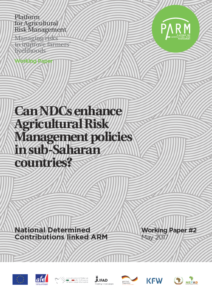
The impact of climate change and natural disasters constrain the agricultural development and increase the vulnerability of the population in many countries. The international community has created a framework to facilitate and empower the climate plans actions of countries, including mitigation and adaptations strategies. Find in this working paper how the synergy between the adaptation actions and international support can enhance the agricultural risk management in 9 sub-Saharan African countries.
Abstract
Following the Paris agreement on climate change in December 2015, the signatory countries have proposed their national Climate Plans called Nationally Determined Contributions (NDCs) to mitigate future changes in climate and adapt to their consequences. These NDCs can be an opportunity to mainstream agricultural risk management (ARM) policies that respond to the new risk and uncertainty environment created by Climate Change. A review of the NDCs of the nine sub-Saharan countries that work with the Platform for Agricultural Risk Management (PARM) highlights that many climate adaptation strategies proposed respond to agricultural risk management needs: climate smart agricultural practices, enhancement of information systems and capacity building, access to finance and markets, improved pest control, and better early warning and = humanitarian plans, are some of the measures proposed in their adaptation plans. Countries climate plans are called to have international financial and technical support. Some international institutions like PARM are investing on agricultural risk assessment and management capacities in developing countries as a means to reduce leverage investment and resilient livelihoods. Proposed risk management tools, if aligned with NDCs, can also contribute to successful adaptation policies.

Working Paper 2: Can NDCs enhance Agricultural Risk Management policies in sub-Saharan countries?
READ MORE
NDCs Registry – United Nations Framework Convention on Climate Change
The NDC Platform: A Comprehensive Resource on National Climate Targets and Action – World Bank
